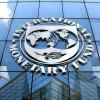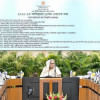Foreign loan commitments drop sharply

There has been a sharp decline in loans commitments by foreign sources to Bangladesh in the first seven months of fiscal year 2024-25, raising concerns about development funding.
As key lenders remain cautious, economic stability, infrastructure projects, and overall national growth could potentially be impacted.
According to the latest data from the Economic Relations Division (ERD), commitments for a total of $2.35 billion in foreign loans were made between July 2024 and January this year.
In stark contrast, development partners had pledged $7.17 billion in loans and grants in the same period of the previous fiscal year, meaning there has been a decline of around 67 percent.
This is mainly due to a sharp fall in assurances for project assistance in the latest seven-month period.
However, there were significant variations in the assurances from different development partners, with some of the major ones reducing their pledges while others continued to support Bangladesh's development needs.
The Asian Development Bank (ADB) committed the highest amount, pledging $700 million, during the period while the International Development Association (IDA), a wing of the World Bank, also made a significant commitment of $944.5 million.
However, some key lenders, including India, China, and Russia, have not made any new commitments during this period.
However, their disbursement figures remain significant, with Russia disbursing $536.87 million, China $267.81 million, and India $80.14 million in the period.
Overall disbursements remained steady, amounting to $3.94 billion in the seven months, whereas it was $4.39 billion in the same period of the preceding fiscal year.
This suggests that while new commitments are falling, previously pledged funds are still being released.
On the other hand, Japan has committed $252.12 million, while Asian Infrastructure Investment Bank has pledged only $160 million, reflecting a cautious approach in lending. Other sources, including multilateral and bilateral lenders, have collectively committed $294.26 million.
The decline in commitments, especially from key lenders, raises concerns about the availability of future financing for critical infrastructure and social development projects.
At the same time, the total amount for debt servicing has increased to $2.42 billion from $1.86 billion in the same period of the preceding fiscal year.
Of the total debt service payments, $1.54 billion was made against principal amounts and the remaining $874 million in the form of interest. This rise in repayment obligations could have made lenders act more carefully before committing fresh funds.
M Masrur Reaz, chairman and CEO of the Policy Exchange of Bangladesh, said Bangladesh is currently facing a very discouraging trend, especially following the huge political transition in August last year.
He stated that the country needed support from development partners now more than ever across multiple critical areas -- including economic recovery, institutional reforms, and infrastructure development.
Over the last couple of years, the economy and institutional frameworks have been significantly affected due to poor policy decisions taken by the past government, he added.
These decisions have had adverse effects, impacting governance, financial stability, and overall national progress, said Reaz.
According to him, support from development partners -- both financial and technical -- is crucial in driving homegrown initiatives.
The commitment of international partners in helping rebuild institutions is encouraging, he added.
However, he said overcoming the setbacks caused by past policies, which often supported vested interests, remains a major challenge.
He added that addressing these issues through complementary efforts from development partners would be vital in reversing this concerning trend.
Selim Raihan, executive director of the South Asian Network on Economic Modeling, said Bangladesh cannot avoid repaying the debt it incurred in the last few years.
He said the country's debt has increased significantly and has now become a burden.
According to him, there were problems in several projects funded by foreign loans because they were not generating the expected returns.
Raihan also mentioned that funds were not utilised properly, causing the debt repayment amount to increase.
Regarding the significant decline in loan commitments, he said there were two main reasons.
Firstly, the interim government is being cautious about taking loans from development partners, he said.
Secondly, the development partners are waiting to see what decisions the interim government will take.
He also said the previous government took large amounts of loans without considering the future burden.
He also said political and other factors might be influencing bilateral lenders' decision to stop making new commitments during this period.
However, Raihan suggested that with careful planning and strong economic management, the country can overcome this challenge and continue its development journey.
The government must strengthen diplomatic and economic engagement with development partners to restore commitment levels in the coming months, he added.

 For all latest news, follow The Daily Star's Google News channel.
For all latest news, follow The Daily Star's Google News channel. 










Comments